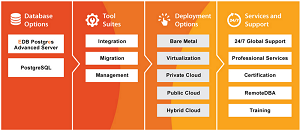News
EnterpriseDB Integrates Postgres in Distro Aimed at Enterprise
- By David Ramel
- May 31, 2016
EnterpriseDB Corp. (EDB) released an operational data management platform based on the open source Postgres object-relational database system, which it integrated with MongoDB and Apache Hadoop.
As it integrates Postgres (also called PostgreSQL) with the NoSQL MongoDB database and the Hadoop Big Data framework, the company said its EDB Postgres platform combines different kinds of data for enterprise analytics.
"EDB Postgres is the first integrated open source-based operational data management platform that brings together all of the components required for managing structured and unstructured data in a federated model," the company said in a statement last week. "The platform enables integration across different databases but it also supports combining unstructured data from NoSQL solutions with corporate, transactional data in structured, relational systems."
EDB's literature positions the subscription-based product as a means to liberate enterprises from expensive database management systems (DBMS), as it wraps services and support around core open source technology in its enterprise offering.
"Open source is the new datacenter standard," the company proclaims on its Web site, citing research from Gartner Inc. that predicted 70 percent of new apps and 50 percent of current apps will run on open source relational databases by 2018.
 [Click on image for larger view.]
EDB Postgres (source: EnterpriseDB)
[Click on image for larger view.]
EDB Postgres (source: EnterpriseDB)
Developers have a choice of using two server versions in the EDB Postgres platform: the open source EDB Postgres Standard Server or EDB Postgres Advanced Server, an enhanced edition featuring extended enterprise-class functionality in performance, scalability and security.
The platform also features: a Management Suite that provides disaster recovery, high availability, monitoring and other functionality; a Migration Suite that facilitates moving workloads to the platform from other solutions, such as Oracle; an Integration Suite that helps replicate data in work with other data solutions such as MongoDB, Hadoop and MySQL databases; and support and services such as training.
"The EDB Postgres platform ensures faster multi-master replication; provisioning of private clouds on OpenStack; greater performance and integration across distributed systems; and new Data Adapters for integrating EDB Postgres with other data management solutions to create hybrid data platforms," the company said.
Along with its Hadoop, MongoDB and MySQL Data Adapters and an EDB Replication Server that boosts data replication services, the platform features cloud management functionality, EDB said.
"With support for self-service provisioning, auto-elasticity, self-healing, load balancing and more in private cloud environments with Red Hat or Community OpenStack Kilo, organizations can better support DevOps practices," the company said. "DBAs can provide their internal and external customers Database-as-a-Service, classifying users based on their needs, use cases and business objectives to speed application development, testing and production."
The solution is available now in three different subscription models: enterprise, standard and developer.
"IT organizations across the globe are struggling to meet the demands of the digital transformation, yet the complex and expensive data infrastructures that serve their established back-office applications lack the flexibility and cost-scalability they need for these new application contexts," EDB quoted IDC analyst Carl Olofson as saying. "Integrated, subscription-based data management platforms like EDB Postgres enable organizations to move to the third platform, by supporting new agile development models and digital applications, and open source-based data management platforms provide the flexibility for reinvestment in new data-driven initiatives."
About the Author
David Ramel is an editor and writer at Converge 360.